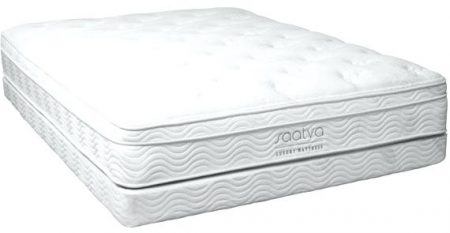Buyer's Guide to Mattresses for Menopause
The term ‘menopause’ refers to the natural ending of a woman’s menstrual cycle. Physicians usually diagnose menopause after a female patient has not experienced a menstrual period for 12 months. According to the latest estimates, roughly 29 million women between the ages of 45 and 64 experience menopause each year. This figure constitutes one-fifth of the U.S. workforce.
Although menopause is a natural biological process, it can bring about unpleasant side effects that negatively impact sleep quality and duration. These include persistent hot flashes and other physical symptoms, as well as emotional issues that make falling and/or staying asleep more difficult. A wide variety of medications and treatments are available for women with menopause, but those who experience extreme sleep problems may find relief by selecting the right mattress.
This guide will explore the different ways that menopause affects sleep, as well as buying tips for first-time mattress shoppers and our picks for the top-rated mattresses for women with menopause.
How Menopause Affects Sleep
According to the Mayo Clinic, menopause typically occurs due to one of the following reasons:
- Age: Women’s bodies begin to produce less hormones (namely estrogen and progesterone) beginning in their late 30s, which causes their fertility to decrease. Menstrual periods usually become shorter, infrequent, and less pronounced in their early 40s. When menopause sets in, the woman’s body will stop producing eggs and they will no longer experience menstrual periods.
- Hysterectomy: The term ‘hysterectomy’ refers to medical removal of a woman’s uterus, as well as her ovaries in some cases. Hysterectomies that remove the uterus only will not result in menopause right away; the woman will no longer experience periods, but her body will still release eggs and produce menstruation hormones. Hysterectomies that remove the uterus and ovaries will result in immediate menopause, and the woman may begin to experience unpleasant symptoms once the surgery is finished.
- Chemotherapy/radiation therapy: In some cases, cancer treatment therapy will induce menopause earlier than intended. Women may experience hot flashes and other symptoms during or after their treatment. However, the menopause may not be permanent — and some women continue to take birth control to avoid unwanted pregnancies.
- Primary ovarian insufficiency: Roughly 1% of women will experience menopause before the age of 40, and this is often due to a condition known as primary ovarian insufficiency. This condition is characterized by ovaries that do not produce enough reproductive hormones, and may be caused by genetic factors and/or autoimmune diseases. Hormone therapy may be prescribed for these women to ensure their brain, heart, and bones are protected until they reach a more suitable age for menopause.
The period leading up to menopause is known as ‘perimenopause.’ Women may experience the following symptoms during perimenopause.
- Irregular menstrual periods
- Vaginal dryness
- Hot flashes and/or chills
- Night sweats
- Sleep onset and/or sleep maintenance problems
- Weight gain
- Thinning hair
- Excessively dry skin
- Mood swings
Additionally, women who have undergone menopause are considered at higher risk for the following:
- Cardiovascular disease: Declining estrogen levels are linked to an increased risk of heart and blood vessel disease. Cardiovascular disease is already the leading cause of death for women, so women who have experienced menopause should consult their doctor about ways to protect their heart and lower their blood pressure.
- Osteoporosis: Osteoporosis is a condition that causes the bones to become porous, making them more brittle and susceptible to breaking. Women are at greater risk of losing bone density in the years following menopause, which can lead to osteoporosis. Additionally, postmenopausal women are more prone to fractures in the wrists, hips, and spine.
- Incontinence: Menopause can cause tissue in the vagina and urethra to lose its elasticity. As a result, postmenopausal women may experience the need to urinate frequently, and may also experience involuntary urination (or urge incontinence) when they perform normal activities like sneezing or lifting objects. Incontinence may also lead to a stronger need to urinate at night.
- Discomfort during sex: Because vaginal dryness often occurs with menopause, postmenopausal women may experience discomfort — and in some cases, bleeding — during sex. They may also feel their sex drive decline.
- Weight gain: A significant number of women gain weight after menopause. The average woman will gain 10 pounds during menopause.
Treatment options for women with menopause include:
- Hormone therapy: Estrogen therapy can be beneficial because it helps reduce hot flashes. Therapy techniques often depend on whether or not the patient still has her uterus.
- Vaginal estrogen: Estrogen may be applied to the vagina using a topical cream or applicator. This can help alleviate vaginal dryness.
- Medications: Physicians may prescribe low-dose antidepressants known as selective serotonin reuptake inhibitors (SSRIs) to minimize hot flashes. Other medications that alleviate hot flashes include Gabapentin (often used to treat seizures) and Clonidine (often used to treat high blood pressure). Medications to treat osteoporosis may be prescribed, as well.
Additionally, women may address symptoms of perimenopause or menopause in different ways, including the following measures:
- Diet: A balanced diet for women with menopause should include high-protein foods such as eggs, legumes, and lean meat, as well as fish with Omega-3 fatty acids (like salmon) and vegetables. Likewise, they should avoid overly sugary or fatty foods.
- Exercise: Running, cycling, and other cardio workouts can help women minimize the symptoms of menopause. Strength training and core-building workouts (such as yoga) may also be beneficial.
- Massage: A proper massage from a licensed professional will improve blood circulation and provide feelings of relaxation that can combat stress.
This guide should not substitute for medical care. If you are experiencing symptoms at any stage of menopause, please contact your physician to discuss treatment measures that are right for you.





